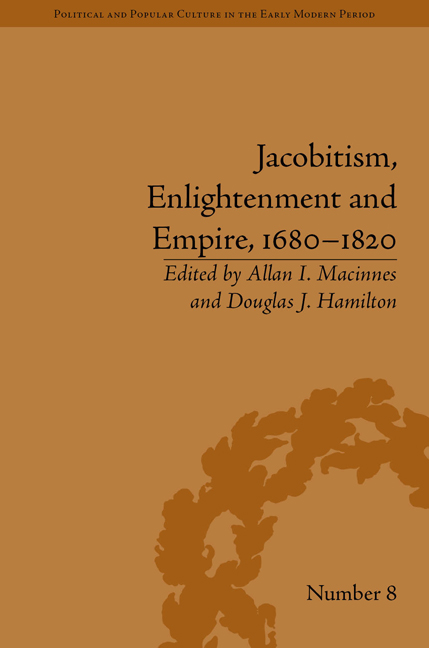Book contents
- Frontmatter
- CONTENTS
- List of Contributors
- List of Tables
- Introduction: Identity, Mobility and Competing Patriotisms
- 1 Jamie the Soldier and the Jacobite Military Threat, 1706–27
- 2 Simply a Jacobite Heroine? The Life Experience of Margaret, Lady Nairne (1673–1747)
- 3 Missionaries or Soldiers for the Jacobite Cause? The Conflict of Loyalties for Scottish Catholic Clergy
- 4 English Liturgy and Scottish Identity: The Case of James Greenshields
- 5 ‘Let Him be an Englishman’: Irish and Scottish Clergy in the Caribbean Church of England, 1610–1720
- 6 Scotland, the Dutch Republic and the Union: Commerce and Cosmopolitanism
- 7 Clearing the Smokescreen of Early Scottish Mercantile Identity: From Leeward Sugar Plantations to Scottish Country Estates c. 1680–1730
- 8 Union, Empire and Global Adventuring with a Jacobite Twist
- 9 John Drummond of Quarrel: East India Patronage and Jacobite Assimilation, 1720–80
- 10 William Playfair (1759–1823), Scottish Enlightenment from Below?
- 11 The Visionary Voyages of Robert Burns
- 12 ‘Defending the Colonies against Malicious Attacks of Philanthropy’: Scottish Campaigns against the Abolitions of the Slave Trade and Slavery
- Abbreviations
- Notes
- Index
3 - Missionaries or Soldiers for the Jacobite Cause? The Conflict of Loyalties for Scottish Catholic Clergy
- Frontmatter
- CONTENTS
- List of Contributors
- List of Tables
- Introduction: Identity, Mobility and Competing Patriotisms
- 1 Jamie the Soldier and the Jacobite Military Threat, 1706–27
- 2 Simply a Jacobite Heroine? The Life Experience of Margaret, Lady Nairne (1673–1747)
- 3 Missionaries or Soldiers for the Jacobite Cause? The Conflict of Loyalties for Scottish Catholic Clergy
- 4 English Liturgy and Scottish Identity: The Case of James Greenshields
- 5 ‘Let Him be an Englishman’: Irish and Scottish Clergy in the Caribbean Church of England, 1610–1720
- 6 Scotland, the Dutch Republic and the Union: Commerce and Cosmopolitanism
- 7 Clearing the Smokescreen of Early Scottish Mercantile Identity: From Leeward Sugar Plantations to Scottish Country Estates c. 1680–1730
- 8 Union, Empire and Global Adventuring with a Jacobite Twist
- 9 John Drummond of Quarrel: East India Patronage and Jacobite Assimilation, 1720–80
- 10 William Playfair (1759–1823), Scottish Enlightenment from Below?
- 11 The Visionary Voyages of Robert Burns
- 12 ‘Defending the Colonies against Malicious Attacks of Philanthropy’: Scottish Campaigns against the Abolitions of the Slave Trade and Slavery
- Abbreviations
- Notes
- Index
Summary
After 1575 Scottish Catholics provided educational facilities abroad for their sons. The initial impetus and finance had come from Mary Queen of Scots (1542–87) while she was imprisoned in England. Over the course of fifty years colleges were established in Douai, Rome, Paris and Madrid. In addition Scots had taken possession of three Benedictine monasteries – known as Schottenklöster (Scottish cloisters) – in southern Germany, which by the end of the seventeenth century housed an additional college. Their objectives were to give the highest level of education possible to the Scottish Catholic elite and to ordain young men to the priesthood for service in Scotland. They managed to overcome enormous difficulties to achieve a degree of success in both these aims. In the first century of their existence the colleges enrolled more than a thousand students, of whom a quarter were ordained. Of the others, a majority returned home but a significant number remained on the continent often taking up military service with foreign states. As a result the colleges built up extensive networks of supporters at home and abroad consisting mainly of alumni and their families. The longest lasting of the networks developed around the three great families of Gordon, Maxwell and Douglas. The application of the Penal Laws against Catholics in Scotland gave the networks an additional cohesion which strengthened mutual support in the overall aim of the promotion of Catholicism.
- Type
- Chapter
- Information
- Jacobitism, Enlightenment and Empire, 1680–1820 , pp. 43 - 58Publisher: Pickering & ChattoFirst published in: 2014



